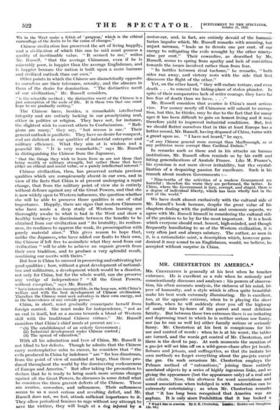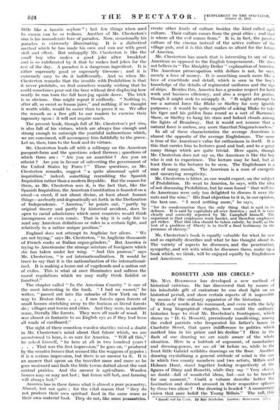MR. CHESTERTON IN AMERICA.* Mn. CHESTERTON is generally at his
best when he touches extremes. He is excellent as a rule when he seriously and conscientiously discusses and analyses : his powers of observa- tion, his often accurate analysis, the richness of his mind, his love of humanity, and a style which is often quite beautiful, make his best work extremely illuminating. He is excellent, too, at the opposite extreme, when he is playing the sheer buffoon, when he will suddenly steer you off the highway of sanity into by-lanes of the purest and most delicious fatuity. But between these two extremes there is an irritating and depressing tract in which he is neither serious nor funny, nor (as he can so well be) either funnily serious or seriously funny. Mr. Chesterton at his best is conspicuous for his use and control of words : when he is at his worst, the tables are turned, and the words get control of Mr. Chesterton, and there is the devil to pay. At such moments the mention of a gas-jet will set him off on a wild-goose-chase after jet beads, flotsam and jetsam, and suffragettes, so that (to imitate his own method) we forget everything about the gas-jets except the gas. On such occasions Mr. Chesterton employs the Pelman method of " catenations," joining these entirely unrelated objects by a series of highly ingenious links, and so giving the appearance (but the appearance only) of a real and solid chain. Now, this alertness for word associations and sound associations when indulged in with moderation can be extremely entertaining ; as when Mr. Chesterton remarks that " it has long been recognized. that America was an asylum. It is only since Prohibition that it has looked a • Whoa Sow in Americo. By G. K. Chesterton. Landon : Hodder and Stoughton. 12e. W.]
little like a lunatic asylum " ; but few things when used to excess can be so tedious: Another of Mr. Chesterton's sins is his immoderate love of paradox. Now, occasionally his paradox is extremely illuminating. It is a dialectical method which he has made his own and can use with great skill and effect. But unhappily Mr. Chesterton is like the small boy who makes a good joke after breakfast and is so exhilarated by it that he makes bad jokes for the rest of the day. A paradox is a dangerous ingredient. It is either supremely good or supremely tiresome ; and it is extremely easy to do it indifferently. And so when Mr. Chesterton remarks that the trouble with Prohibition is that it never prohibits, we find ourselves wearily wishing that he could sometimes pour out the beer without first displaying how neatly he can turn the full beer-jug upside down. The trick is so obvious. One might repeat it endlessly. " Nothing is, after all, so sweet as lemon juice," and nothing, if we thought it worth while, would be easier than to prove it so. We offer the remark as a free gift to our readers to exercise their ingenuity upon : it will not require much.
The present book, though full of Mr. Chesterton's pet sins, is also full of his virtues, which are always fine enough and strong enough to outweigh the youthful indiscretions which, we are convinced, will accompany him faithfully to the grave. Let us, then, turn to the book and its virtues.
Mr. Chesterton leads off with a soliloquy on the American passport-form and the questions asked thereon ; questions of which three are " Are you an anarchist ? Are you an atheist ? Are you in favour of subverting the government of the United States by Farce ? " These questions, as Mr. Chesterton remarks, suggest " a quite abnormal spirit of inquisition," indeed, something resembling the Spanish Inquisition rather than a modern Republic. But the reason for them, as Mr. Chesterton sees it, is the fact that, like the Spanish Inquisition, the American Constitution is founded on a creed—a creed, if not about divine, at least about human things—as clearly and dogmatically set forth in the Declaration of Independence. " America," he points out, ." partly by original theory and partly by historical accident, does lie open to racial admixtures which most countries would think incongruous or even comic. That is why it is only fair to read any American definitions or rules in a certain light, and relatively to a rather unique position."
England does not attempt to Anglicize her aliens. " We are not trying," says Mr. Chesterton, " to Anglicize thousands of French cooks or Italian organ-grinders." But America is trying to Americanize the strange mixture of foreigners which she has taken under her wing. " And this process," says Mr. Chesterton, " is not internationalization. It would be truer to say that it is the nationalization of the international- ized. It is making a home out of vagabonds and a nation out of exiles. This is what at once illuminates and softens the moral regulations which we may really think faddist or fanatical."
The chapter called " In the American Country " is one of the most interesting in the book. " I had no sooner," he writes, " passed out into the suburbs of New York on the way to Boston than . . . I saw forests upon. forests of small houses stretching a'way to the horizon as literal forests do ; villages and towns and cities. And they were, in another sense, literally like forests. They were all made of wood. It was almost as fantastic to an English eye as if they had been all made of cardboard."
The sight of these countless wooden shanties raised a doubt in Mr. Chesterton's mind about that future which, we are accustomed to hear, is so sure for America. " Will all this," he asked himself, " be here at all in two hundred years ? . . . That was the first impression," he goes on, " produced by the wooden houses that seemed like the waggons of gypsies ; it is a serious impression, but there is an answer to it. It is an answer that opens on the traveller more and more as he goes westward and finds the little towns dotted about the vast central prairies. And the answer is agriculture. Wooden houses may or may not last ; but farms will last, and farming will always last."
America has in these farms what is almost a pure peasantry. Almost, but not quite ; for the vital reason that " they do not produce their own spiritual food in the same sense as their own material food. They do not, like some peasantrics. create other kinds of culture besides the kind called agri- culture. Their culture comes from the great cities ; and that is where all the evil comes from." It is, in fact, the passive culture of the cinema instead of the active culture of the village pub, and it is this that makes us afraid for the future of America.
Mr. Chesterton has much that is interesting to say of the American as opposed to the English temperament. He does not believe in " The Almighty Dollar " explanation of America.
The American preoccupation with dollars is not, he says, merely a love of money. It is something much more like a love of exactitude and detail, which is seen in the boy's knowledge of the details of regimental uniforms and the rigs of ships. Besides this, America has a genuine respect for hard work and business efficiency, and also a respect for genius, though it might seek to misapply it. " It might attempt to use a natural force like Blake or Shelley for very ignoble purposes ; it would be quite capable of asking Blake to take his tiger and his golden lions round as a sort of Barnum's Show, or Shelley to hang his stars and haloed clouds among
the lights of Broadway. But it would not assume that a natural force is useless, any more. than that Niagara is useless." In all of these characteristics the average American is almost the opposite of the average Englishman. The same is true of the American's value for enthusiasm in itself. It is
this that carries him to lectures good and bad, and to a great many things which are quite trivial. Here again, though Mr. Chesterton does not say so, the American is like the boy who is out to experience. The lecture may be bad, but at least there is the lecturer to be seen. The Englishman is a man of many moods. The American is a man of energetic and unvarying receptivity.
Mr. Chesterton is bitter, as one would expect, on the subject of Prohibition. He went to America, he says, with the idea of not discussing Prohibition, but he soon found " that well-to-
do Americans were only too delighted to discuss it over the nuts and the wine." His final objection to it is, in our opinion, the best one. " I need nothing more," he says,
" for its condemnation than the only thing that is said in its defence. It is said by capitalists all over America ; and it is very clearly and correctly reported by Mr. Campbell himself. The argument is that employees work harder, and therefore employers get richer. That this idea should be taken calmly, by itself, .as the test of a problem of liberty is in itself a final testimony to the presence of slavery."
Mr. Chesterton's book is equally valuable for what he saw and so capitally describes and what he has thought about it.
The variety of aspects he discusses, and the penetration, sympathy, and wit with which he discusses them, make up a book which, we think, will be enjoyed equally by Englishmen and Americans.



































































 Previous page
Previous page